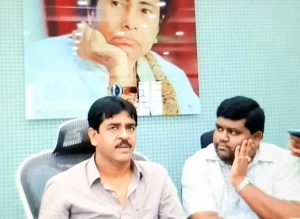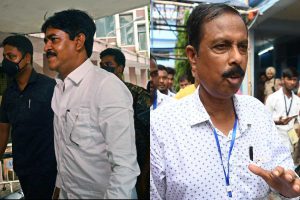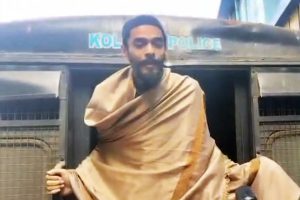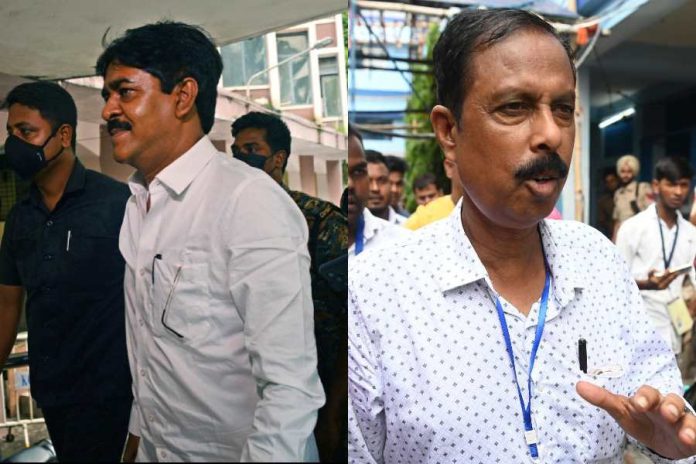Synopsis:
Explore the political turmoil in Bhangar, West Bengal, where Arabul Islam and Shaukat Mulla used coercion and violence to maintain control, leading locals to turn towards the Indian Secular Front (ISF) for democratic change.
QalamTimes News Network
Bhangar, West Bengal | September 16, 2025
Bhangar : A Region Under Shadow


Bhangar, a town in West Bengal, has for years been at the center of political turbulence. The landscape is no longer defined merely by party affiliations or development debates, but by a climate of fear and coercion. Two figures dominate this narrative: Arabul Islam and Shaukat Mulla. Both, in their own ways, have imposed authority through intimidation, shaping local governance not through consent but through coercion.
The once-traditional political loyalties of Bhangar’s Muslim community, historically aligned with leaders like Mamta Banerjee, have shifted. The reason is not ideological, but experiential—residents have increasingly associated the Trinamool Congress (TMC) with the heavy-handed tactics of Islam and Mulla. Their methods of asserting control—ranging from threats to orchestrated violence—created a vacuum in local political trust.
Shaukat Mulla: Power Backed by Intimidation


Shaukat Mulla, the TMC MLA from Canning East, emerged as a dominant presence in Bhangar’s politics over the last few years. While officially a representative of democratic governance, reports and eyewitness accounts suggest that his rise was buttressed by an environment of fear. In a tragic incident, a TMC leader associated with Mulla was shot dead in Bhangar, highlighting the lethal undercurrents of local politics. The police detained two individuals in connection with the shooting, but the incident reinforced Mulla’s grip on power.
Mulla’s influence extends beyond Bhangar, reaching nearby Sandeshkhali, where his interventions in local disputes and political maneuvering reveal a strategy centered on control rather than democratic representation. Political rivals and dissenters frequently face intimidation, discouraging open opposition.
Arabul Islam: The Architect of Coercion


Arabul Islam, a former TMC MLA, has a longer and equally controversial political footprint. Historically, Islam’s tenure in Bhangar was marked by a pattern of suppressing dissent. In 2017, a TMC leader linked to Islam was gunned down, signaling that violent confrontations were becoming a norm in the political landscape.
More recently, in February 2024, Islam was arrested for involvement in the murder of an Indian Secular Front (ISF) worker during the Panchayat elections. Even under arrest, Islam sought enhanced security, indicating a network of influence and the persistence of threat perception in the region. Residents repeatedly describe an atmosphere where speaking against powerful leaders invites reprisal, ensuring that political power remains concentrated in the hands of a few.
The Rise of ISF and Public Response


The oppressive tactics of Arabul Islam and Shaukat Mulla inadvertently contributed to the rise of the Indian Secular Front (ISF) in Bhangar. Frustrated by decades of fear-driven governance, locals gravitated towards Abbas Siddique’s ISF as a vehicle for change. In the most recent elections, Nawsad Siddique was elected MLA, reflecting a broader desire among residents for leadership untainted by intimidation and coercion.
The shift indicates that when political authority relies on fear rather than legitimacy, it creates space for alternative movements. The people of Bhangar, tired of living under the shadow of violence, sought representatives who could restore a sense of safety and fairness in governance.
Political Violence and Governance: Lessons from Bhangar
Bhangar’s trajectory underscores a critical lesson: when local leadership depends on coercion, the social contract between the state and citizens breaks down. Arabul Islam and Shaukat Mulla’s reign demonstrates how political power, wielded through fear, undermines community cohesion and democratic norms. The rise of ISF is a direct response to this vacuum—a choice for accountability over intimidation.
The region continues to face tensions, with sporadic violence reminding citizens of the cost of unchecked power. Yet, the Bhangar experience also illuminates hope: communities, when organized and mobilized, can challenge entrenched political coercion. The story of Arabul Islam and Shaukat Mulla is not just one of oppression—it is also a cautionary tale for all regions where political might overrides civic rights.
Bhangar today stands at a crossroads. The legacy of fear and repression left by Arabul Islam and Shaukat Mulla remains palpable. However, the electoral success of ISF signals the community’s determination to reclaim agency and redefine governance. It is a testament to the enduring principle that political legitimacy must rest on public consent, not on intimidation or terror.
In the end, the tale of Bhangar is both a warning and an inspiration: unchecked power may dominate temporarily, but civic resolve can eventually restore democracy and justice.







